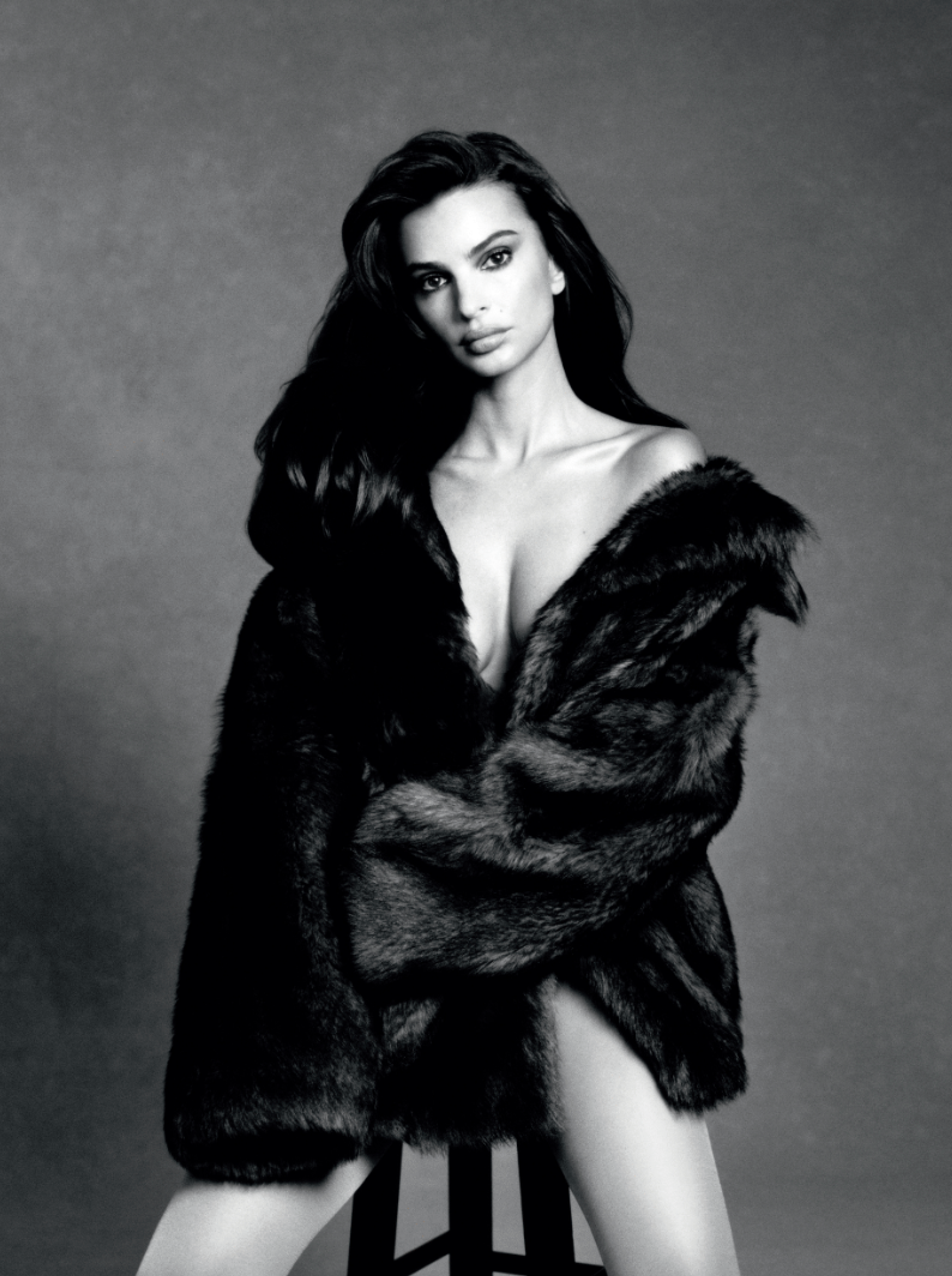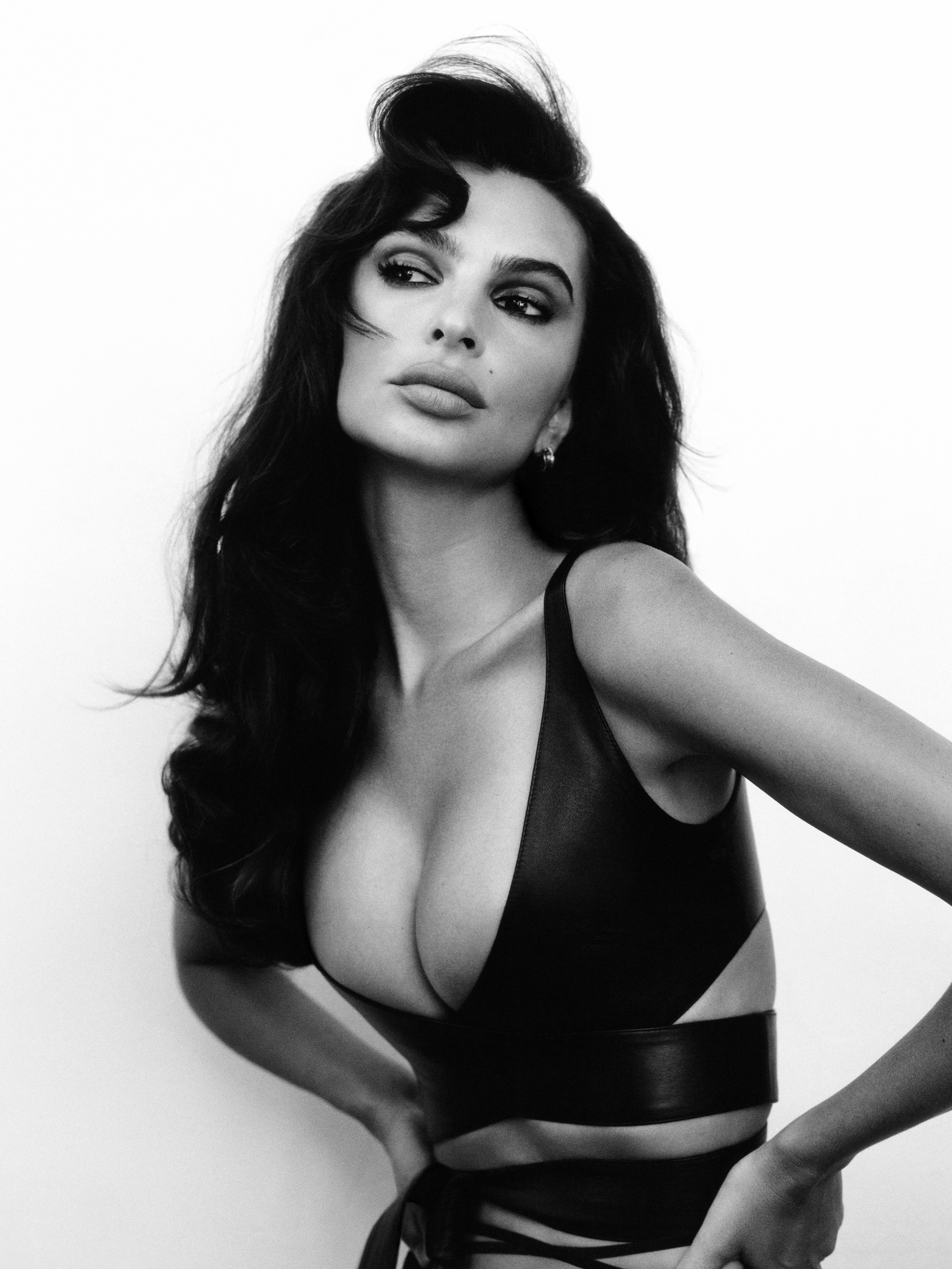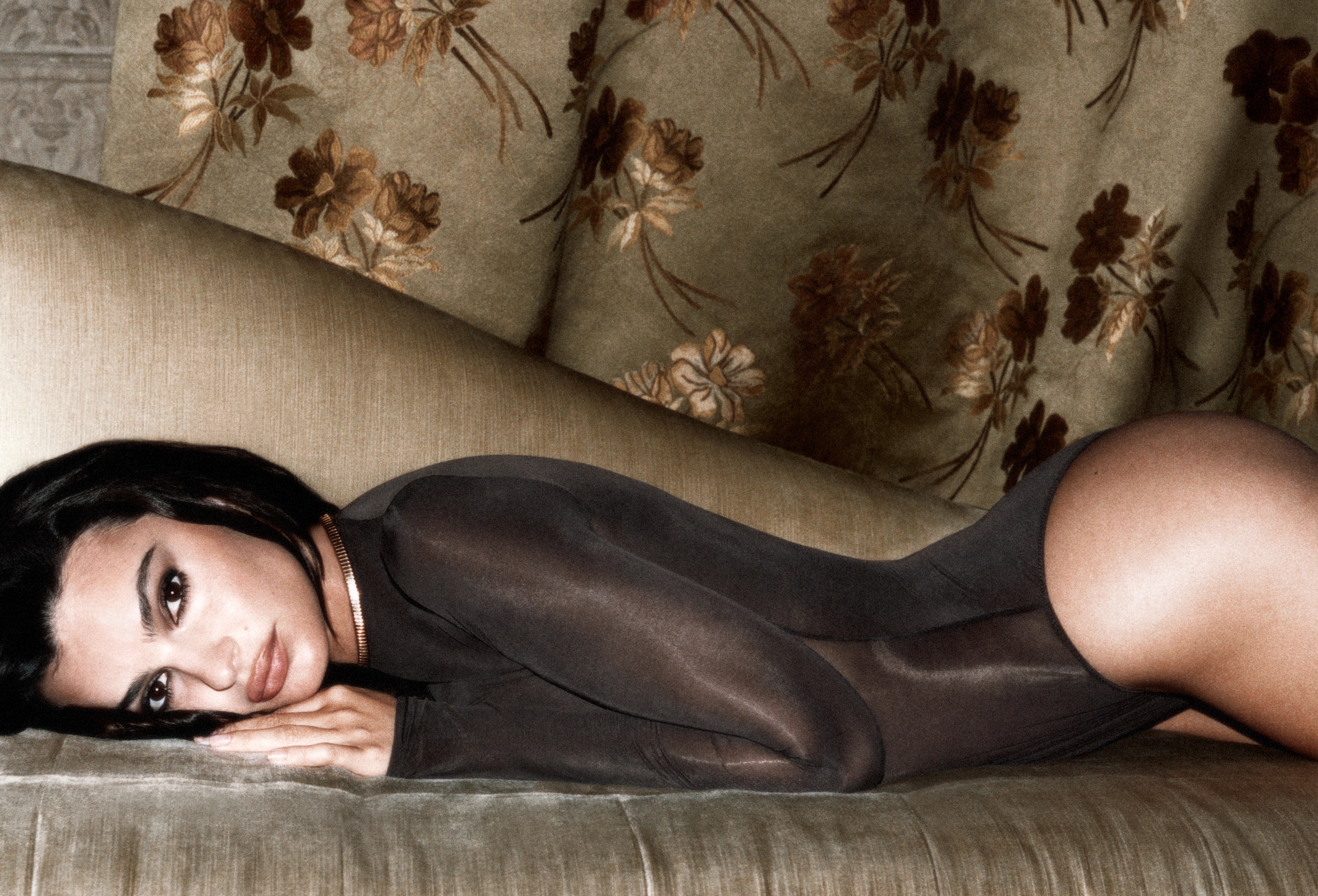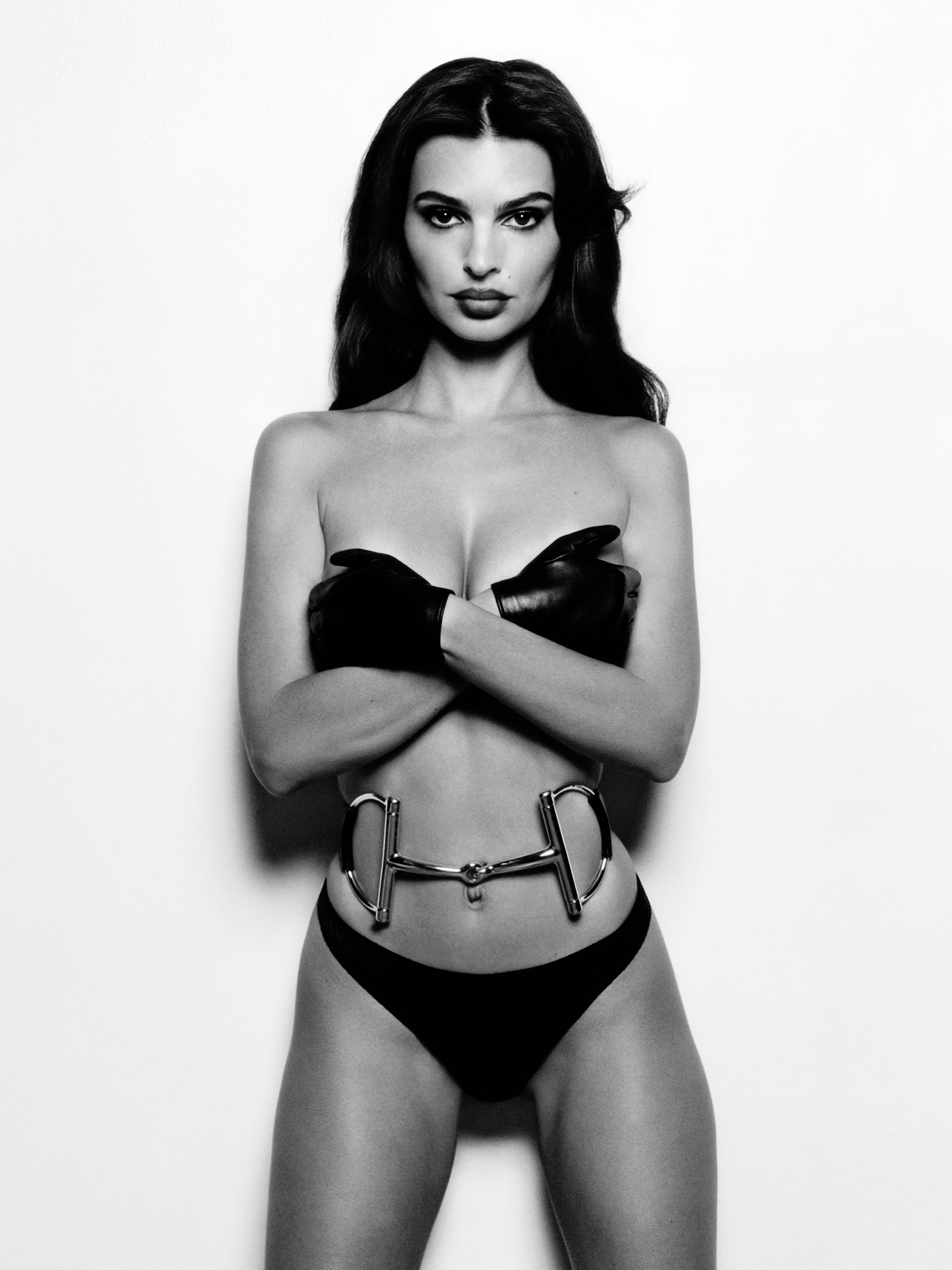Noise
STAR POWER: EMILY RATAJKOWSKI

STAR POWER
Words: 3030
Estimated reading time: 17M
Emily Ratajkowski’s singular beauty thrust her into the spotlight—but it’s her grace, her nerve, and her voice that’ll hold her there forever.
By Biz Sherbert
Emily Ratajkowski is one of the most famous women alive. She’s famous in the old-fashioned sense—a single photo of her can stop the planet spinning, and it’s easy to imagine the air in any room carrying more weight as soon as she enters. But even while in possession of a star power largely gone by, Emily is fully here and now, tuned into and responding to the conditions of the present. Like many millennial women, she posts TikToks about her love life and bad haircuts, cares deeply about the state of the world, and has a complicated relationship with Instagram.
Emily’s rise can be attributed to her looks—she is a petite brunette with impossible curves and a face that is both feline and doe-eyed. Her beauty transcends language and borders. After appearing in a viral music video in 2013, she became an instant cultural obsession: gaining millions of followers, landing a succession of high-profile modeling and acting jobs, and reshaping the landscape of female desirability upon impact.
It’s possible to plot the cultural passage of time according to Emily’s greatest hits on Instagram: 2018 is her courtside at a Lakers game, in jeans and a white crop top; 2020 is her lower back, temp-tatted with “emrata,” her social media handle-turned-nickname; 2025 is a selfie flashing her “divorce rings,” the double diamonds of her engagement ring now separated. But Emily was never a flat image. She campaigned for democratic socialist Bernie Sanders when most of Hollywood was stuck on Hillary, was arrested for protesting Brett Kavanaugh’s appointment to the Supreme Court following allegations of his sexual misconduct, and constantly shares her own critical thoughts alongside sexy selfies. She hosted a podcast about philosophy, politics, and modern feminism, and works closely with Lena Dunham, whose public image itself was somewhat of a political statement on what it meant to be a contemporary woman.
In many ways, Emily is the blueprint for one of the most dominant representations of modern womanhood: the hot girl. The hot girl reads, writes, has opinions, experiences mental illness, and loves to have fun with her friends. The existence of “hot girl” as qualifier is reflective of a social media-driven emphasis on image, but it also is a self-aware acknowledgement of how the world works. Looking good, or at least feeling good about how you look, is often a real step toward getting what you want. Emily gets this—she also gets that it’s complicated. She wrote a whole book about it: the New York Times Best Seller My Body.
Now, at 34, Emily is taking on her biggest role yet. This year she revealed an untitled A24 series for Apple TV+ that she’ll write, produce, and star in, teaming up with author Stephanie Danler and Lena, fresh off their collaboration on Netflix’s Too Much. It’s still early stages, but the project is expected to explore themes of identity and modern motherhood, drawing on Emily’s own experiences as the mother of a young child.
For Beyond Noise, she sits down with friend and fellow hot-girl-who-does-it-all Rachel Sennott. They discuss the writer’s room, balancing creativity with corporate demands, and the stories they hope to tell about being a woman today.
BIZ SHERBERT: You’re both leading new shows—Emily, with your A24 series, and Rachel, I Love LA.
Emily Ratajkowski: Rachel should start, because hers is about to come out. [Let’s hear] about your process, your journey...
Rachel Sennott: Up until this show, my process was always to wake up at 5 a.m. and make a coffee. Sit down and write until 10 a.m. Maybe I’ll go on a walk, I’ll do some emails, whatever. Then I come back to it in the afternoon and clean it up a little. If I’m writing with a friend, we meet up in a coffee shop in the morning. But during this process, the bohemian aspects [have been] ripped away by working in a writers’ room with all these other people. You can’t just do what you want to do. It was honestly really challenging for me.
ER: That’s so hard. I’ve had a real journey related to imposter syndrome. I wrote my book, literally, on my phone. Obviously, I put things into docs eventually, but I started every essay in the Notes app, and then would use Google Docs on my phone to not have to have that moment where you sit down at a computer like, I’m writing a book, because that’s so scary. That was five years ago. Now I have a desk. I have my bookshelf. I have a proper computer. I’ve really embraced it, but I loved how I could trick myself into thinking what I was doing wasn’t important. There’s obviously the corporate side of that as well, like, You need to do these things today. It’s the opposite of art-making.
RS: I was literally just talking to my therapist about this. We’re still in edit, but we’re almost done. I always like to reflect and see how I can improve, or what things I want to change. It’s almost like you have to do the corporate [process]—figure out why it’s important—then infuse it with creativity. Because it is a pressure thing when you’re in an office, like, Oh my god. This is so serious. I need to find ways to make it feel fun and fresh too.
ER: It sounds so corny, but it’s feeling inspired and genuinely in love with the thing you’re working on. Like I’m writing something by myself, and on my terms. I feel really locked into the work I’m doing, and the work feels better. But that’s not always true. Lena Dunham said to me: ‘TV is different than anything else. You have to fall in love with it over and over and over again.’ TV goes through so many different channels and so many different people... It’s like a long-term marriage, you know?
RS: It’s so funny. In a marriage, a friendship, or your relationship with your family, people change at different times. There’s going to be weird growth spurts, uncomfortable shedding, and so many parts to the process. We did the pilot, which took a long time, then we got the show picked up. By the time we’re doing the room, I feel like I already did a whole season. Are you doing a pilot first?
ER: We’re still in development. We have a pilot, that’s what I’m working on right now. Honestly, I was really happy when the announcement went out. You put so much of your heart and soul into it, and what’s so terrifying about this process is that there’s a world where it just [doesn’t happen]. The state of TV—it’s a stressful time. People are pretty confused between AI, the strikes, streaming. It’s a really insane, high-risk situation, and that doesn’t necessarily bode well for the creative process.
RS: It is so crazy, announcing stuff and sharing it. There was a moment when we were shooting where if I posted a TikTok drinking a matcha, everyone would be like, ‘Go work on your show, mama. We need it. Get it done.’ And I’m like, dying. I’m literally not well at all. You want to talk to people about how intense [it is], or the number of steps in the process: Trust me, I’m not chilling, I’m working on this.
ER: That means that they really care about it. Which is exciting and can help motivate you to be like, Now I really have to fucking do it. I’m somebody who does well with pressure like that, and I have a lot to prove. How does it feel now that your show’s about to come out?
RS: It’s weird. You have to choose moments to celebrate. But this is the first time I’ve celebrated as I’m making it—celebrated how hard it is to make something, but also how fun and special and fulfilling it is. I’m trying to focus on that as opposed to putting too much pressure [on myself], but I’m a control freak. I have all these markers of what something should feel like and be like, but it’s never exactly what I think. With Bottoms, I was so obsessed and then there was a strike. But so many people talked about the movie on their own, it was word-of-mouth and so much better than what I had envisioned.
ER: My writing partner [for the show], we became friends while I was writing my book. She said to me, ‘Writing is so hard, but it’s the best part of the process.’ Once you edit, not as fun; once it comes out and you have to talk about it relentlessly, not as fun. I’m in that stage of kumbaya, like, This is what life is for. I’m making art and I’m getting paid. That’s so fucking cool. Whatever happens, it doesn’t matter. Because that is the success: the process, having the time, being able to do it.
BS: When you guys are in that difficult headspace, how do you talk yourself down? What does resetting look like?
ER: For me, it’s the state of the world right now. Not to be super macro about it, but I think it’s a thing people can relate to—where you feel completely out of control with politics, with genocide, with climate change. And then you’re like, But today I did something kind and had a nice talk with somebody that matters to me. I cooked a meal and I planted a tree and I did something for the community. It’s the small things, and that applies to writing sometimes.
RS: It’s like doing arts and crafts of the mind, or problem-solving. It’s easy to get really overwhelmed by all the things going on in the world, and we should be concerned about them, but also find where we can contribute. I had a moment when we were all at the wedding, talking about your show and my show. It’s really cool to have a community of people making different stuff. I’m so excited to see what you’re making, and I’m so excited for the next season of Benny [Drama’s] show.
ER: I had the same exact thought. Historically, in Hollywood or in fashion, there’s this scarcity mindset where there can only be one of this or one of that. We’re culturally programmed to think that way. I’m so glad that I have found a community of people who are doing cool shit and sharing their resources—sharing their ideas, knowledge, and experiences.
RS: Yeah, you only win from other people winning. Everyone helps each other out along the way. If I ever write a book, I’m calling your ass at 3 a.m.
BS: You both came of age in a golden, but also un-golden age of social media where it was easier to find your niche. What role does the internet play in your lives today?
RS: I kind of want to talk about your hair journey, Emily—when you got your bangs. [Laughs] I felt so invested in that, literally, like, What’s gonna happen? You have such a great balance online, where you’re funny and real, but there’s a boundary up too. There’s stuff you’re protecting.
ER: The internet’s changed so much. TikTok is absolutely a source of inspiration for me, everyone’s fucking hilarious and you are rewarded for not projecting a persona. You’re rewarded for feeling natural. That is so diametrically opposed to the Instagram that I built brick-by-brick, with bikini pics. [Laughs] I like that dichotomy. We all have to be flexible. I play on both a bit, but in a dream world I would never have to post on Instagram again. I’m obviously super grateful for the platform. I’m just more interested in delivering [something] honest. I feel like I have been on a journey, as has the world, and we adapt.
RS: Totally. It’s changed so much. There’s so many versions of yourself. I had to step away [from social media] and come back, because I used to tweet in this way that was so immediate to what I was feeling, to what was happening. I changed who I was as a person, but there was still this version of myself that I was performing, that was left over. I had to pull back from it. One thing that’s been really nice about the show is I’ve been online less.
ER: When you start really being present and you’re doing fulfilling work, the internet becomes less of a focus, which is nice. But I also have so much respect for people whose focus is the internet. They fucking do an incredible job.
RS: It’s a full-time job! [But] you can come back to it too. Now the schedule is getting a little lighter. I’m in the edit. I’m like, I kind of want to do a little dance. I kind of want to do a little lip sync. [Laughs] You know what I mean?
ER: You can use it as a tool, when and how you want to. It’s just not the world; I’ve definitely taken a big step back once I became a mom. I don’t have the same energy I used to for it.
BS: What experience do you want to capture in your art that you haven’t seen?
RS: I’ve said this before, but the first movie that I saw where I was like, Oh my god, this is my shit, is Bling Ring. It was just so much fun. It was funny, but it was also cool. In the process of making the show, I kept referencing Hannah Montana. Those are two very different references, but I love when you’re watching something and you’re like, Oh, I can relax. Like, I know I’m gonna have fun, or I know I’m gonna be taken on a ride. I feel that when I watch [Hannah Montana] and when I watch a Sofia Coppola movie—making my audience feel relaxed is what I want to accomplish.
ER: I love that. I’ve had so many different women that I’ve been influenced by. Overall, I think about Jane Fonda and how ahead of her time she was. She was making workout videos, while also being really political, while also being a serious actress—really herself in a way that was obviously pre-internet, but translated so much. I also just watched the Martha Stewart documentary. There’s something there, this innovative approach to telling your story and to being seen, for lack of a better term. And I really admire Lena, which is why it’s so exciting that she’s on this project. I remember seeing an ad for Girls on the side of a bus, and being like, ‘What the fuck is that? That’s gonna be bad, or it’s gonna change my life.’ She was so ahead of her time.
RS: I know, it’s crazy. She did this job at 25? One time I texted her, drunk, in the middle of the night, like, ‘Hey, how did you do this?’ Even if everyone didn’t get it at the time, it’s having a moment in the culture.
ER: I love Gen Z’s appreciation for Girls, because it’s millennial cringe and it’s funny because of that—before that was even a term or an idea.
BS: What writing advice would you give to the dear readers of this profile?
ER: Mine’s so obvious—you’re going to write so many bad things, and then it gets better and better. I sometimes get so disheartened. But now I’ve been lucky enough to work with people I really respect and admire, and see how bad their first ideas are. [Laughs] It’s really comforting. Ocean Vuong—who I love as a writer—said something like, ‘No one’s gonna make anything if we don’t allow ourselves to be cringe, because that’s where it starts.’
RS: Totally. How are you ever gonna get to a good idea if you’re afraid to say the first bad thing? In writers’ rooms, everyone’s always like: ‘This is the bad version...’ You have to say it to protect yourself, but sometimes it’s a good idea.
ER: The bad pitch is the beginning of the good pitch.
RS: A hundred percent. I had to become okay with getting rid of or changing things.
ER: I’m learning that right now. You have to kill the things you were in love with, and fall in love with new things. That’s the journey.

Top by ALAÏA. Tights by KNWLS.

Bodysuit by SAINT LAURENT BY ANTHONY VACCARELLO. Necklace by BVLGARI.

Gloves and belt by GUCCI.
CREATIVE DIRECTOR + EIC
SARAH RICHARDSON
PHOTOGRAPHY
LARISSA HOFMANN
FASHION EDITOR
FRAN BURNS
TALENT
Emily Ratajkowski at DNA Models
HAIR
Jimmy Paul at Susan Price
MAKE-UP
Emi Kaneko at Bryant Artists
MANICURE
Honey at Exposure NY
SET DESIGN
Spencer Vrooman
PHOTO ASSISTANT
Joe Menard
STYLIST ASSISTANT
Letizia Maggio
PRODUCTION
Tann Services
Beyond Noise 2026
CREATIVE DIRECTOR + EIC
SARAH RICHARDSON
PHOTOGRAPHY
LARISSA HOFMANN
FASHION EDITOR
FRAN BURNS
TALENT
Emily Ratajkowski at DNA Models
HAIR
Jimmy Paul at Susan Price
MAKE-UP
Emi Kaneko at Bryant Artists
MANICURE
Honey at Exposure NY
SET DESIGN
Spencer Vrooman
PHOTO ASSISTANT
Joe Menard
STYLIST ASSISTANT
Letizia Maggio
PRODUCTION
Tann Services
Beyond Noise 2026
